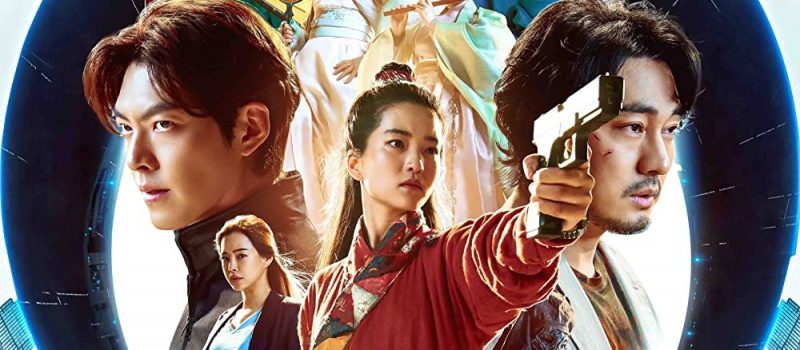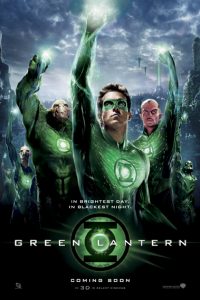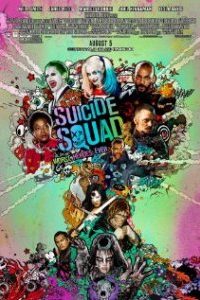Thunder and Love: Josh Pearce and Arley Sorg Discuss Alienoid
 This South Korean movie blends magic, time travel, robots, aliens, alien robots, spaceships, and shapeshifting cats all into 140 minutes of action, comedy, horror, and even a lil bit o’ luv. Something for everyone! In fact, it’s hard to take any two still frames from Alienoid and believe that they’re from the same movie, but the fun is in the bridging of genres. Not to give too much away, but we will warn that this is “part one,” so be prepared for a lack of resolution. That said, there’s still enough in this first half to give a sense of complete story arc.
This South Korean movie blends magic, time travel, robots, aliens, alien robots, spaceships, and shapeshifting cats all into 140 minutes of action, comedy, horror, and even a lil bit o’ luv. Something for everyone! In fact, it’s hard to take any two still frames from Alienoid and believe that they’re from the same movie, but the fun is in the bridging of genres. Not to give too much away, but we will warn that this is “part one,” so be prepared for a lack of resolution. That said, there’s still enough in this first half to give a sense of complete story arc.
Josh: I thought this movie was great!
Arley: Dude. Were you high, or just drunk?
Josh: I had a beer, sure, but I was just having fun watching this.
Arley: As a movie, I didn’t really like it. There were moments or elements that I liked, but not as a whole. And I was really upset that it was part one.
The film divides its long runtime between the modern day (2012-2022) and the late Goryeo period (roughly 1380-1390) of Korea. Two alien/robots — one humanoid, named Guard (Kim Woo-bin), and one polymorphic, though mostly flying, named Thunder (voiced by Kim Dae-myung) — are stationed on Earth, because their civilization imprisons criminals within the brains of unwitting humans. Using a device called the Divine Blade, Guard and Thunder enforce their law on any alien escapees throughout history.
Meanwhile(?) in the 14th century, the (comparatively) young magician Mureuk (Ryu Jun-yeol) learns of the existence of a powerful artifact, and races to get it before any of the other local magic users find it first. His efforts are thwarted by a mysterious stranger: Lee Ahn AKA “the girl who shoots thunder”* (Kim Tae-ri), who wears a Casio wristwatch and carries semiautomatic handguns.
The timelines entangle when an alien criminal mastermind called the Controller causes a jailbreak and tries to xenoform Earth’s atmosphere, potentially killing every human.
Josh: I really got into the science fiction aspects. The reverse alien abduction at the hospital, the spaceships — and I thought the creature and technology designs all looked pretty cool.
Arley: I disagree. The science fiction was so hokey, and I found myself nitpicking a lot of shit. There are too many things that just seemed really random. To me, it’s Doctor Who-level science fiction**.
Josh: That’s a good comparison. I didn’t watch Doctor Who growing up, so when I finally did see it, the premise was ridiculous and the technology was silly, but there were still really good, solid episodes built off that.
Arley: This reminded of that Kyle McLachlan movie, The Hidden, because alien slugs invading bodies – fairly similar idea but nicely repurposed.
Josh: Alien parasites are certainly an SF trope: that “Conspiracy” TNG episode, The Wrath of Khan, etc. We’ve seen everything in this movie before: alien slugs, elevator fights, robots with glowing red eyes that shoot lasers, time travel, but we haven’t necessarily seen them all thrown together. It’s a thorough mix of science fiction and fantasy — if you really want, you can try explaining away the magic as “because aliens.” Or it could be a comment on modern storytelling versus traditional storytelling. The film doesn’t explain it, but it doesn’t have to. The fun of it pulled me along.
Arley: I feel like the storytelling style is closer to Asian fantasy TV and movies, at least in my admittedly very limited experience. But this is not in the vein of, you know, The Wandering Earth in any way, shape, or form, or Space Sweepers. It’s more akin to fantasy stories about immortals and their shenanigans. Specifically, shows and films along those fantasy lines seem less concerned with worldbuilding rules or consistency, and more interested in thematic elements, interpersonal story, and throw in powers and effects they feel are cool, or which match up to classical stories in some instances. (Again: in my quite limited experience, so – I could be wrong.) Might be that I expected something different, or that this just isn’t for me. I’m really surprised you liked this movie, because you don’t like that mix of science fiction and fantasy in Marvel movies.
Josh: That’s why I’m surprised you didn’t like this, because I felt it was hitting that tone that Marvel movies are aiming for.
Arley: You usually want Marvel movies to not take themselves so seriously.
Josh: I think they work as serious stories on page, but that tone hasn’t translated to film as successfully, yet. Except Infinity War did a pretty good job, because everyone died. It was great.
There’s a lot flying across the screen at any one time in Alienoid, and the non-linear storytelling makes extra effort at obscuring exactly what’s going on until somewhere in the third act. The great cast and characters make up for a lot of the initial disorientation. Because Guard and Thunder can both take on (the same) human appearance, Kim Woo-bin puts his fashion model looks to work by first staring emotionlessly at the camera, and then chameleon shifting through a flurry of personalities all in the space of a single scene.
Ryu Jun-yeol’s rogue-like Mureuk is an entertaining character type: the con man with a hidden talent. Kim Tae-ri notches up another excellent performance and show-stealing character — she previously played our favorite character from Space Sweepers (and was excellent in The Handmaiden, too).
Arley: I do like these characters, and that goes a long way towards carrying the film. For me, it was really about her, the “girl” who shoots thunder. She was awesome and her character was great!
Josh: There’s a love story in there, which is cute, but not sappy or shoehorned in. They come across each other in the middle of a heist and there are connection sparks, then they go off and do their own shit.
Arley: I hate love stories, usually [laughs]. I feel like in American cinema, they’re just so obligatory, they happen in nearly every movie. Most obnoxious is the so-called love story which is essentially a sexist trope, where a (usually male) hero lands the love interest at the end of the story as some kind of implicit reward. But in this film, I thought the love story was really charming.
Josh: I think that speaks to the actors’ skills. There were a lot of interesting characters who didn’t require a ton of time spent building them up as interesting. Everyone had something going on, you got it really quickly, and then it all came into play down the line.
Arley: Guard and Thunder taking the baby home broke the movie’s believability for me. The film hadn’t yet established the characters enough to convince me they would act that way, and they later try to sell us on them raising her for years without really changing the way they behave. She would probably not grow up to be as stable and functional as she was if she’d been raised by a cold and emotionless robot.
Josh: It’s completely opposite the premise for Raised by Wolves, where they’re raised by androids, but the androids are warm and devoted. The one thing that broke the film for me is that these people in the past had watches that still worked after 10 years with no replacement batteries. Yeah right!
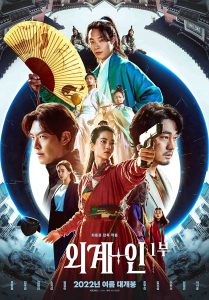 Director Choi Dong-hoon’s filmmaking skill in setting up a scene is most evident during a sequence in which two other magicians — Madame Black (Yum Jung-ah) and Mr. Blue (Jo Woo-jin), known as “the Sorcerors of Twin Peaks” — are poisoned by the big bad. Using controlled breathing and careful movements, they try to ingest the antidote before paralysis sets in. Into the middle of this, Mureuk rappels from the ceiling, Mission Impossible-style, to swipe a MacGuffin, just as the villain’s minions rush in with swords swinging. There is a ticking clock because an off-screen character has also been poisoned, and everyone has to make choices about what kind of people they are, who to trust, and who to help. There is slapstick and tension, and a lot of non-verbal character development in the middle of an action scene. And then the whole room goes up in flames. It just keeps escalating.
Director Choi Dong-hoon’s filmmaking skill in setting up a scene is most evident during a sequence in which two other magicians — Madame Black (Yum Jung-ah) and Mr. Blue (Jo Woo-jin), known as “the Sorcerors of Twin Peaks” — are poisoned by the big bad. Using controlled breathing and careful movements, they try to ingest the antidote before paralysis sets in. Into the middle of this, Mureuk rappels from the ceiling, Mission Impossible-style, to swipe a MacGuffin, just as the villain’s minions rush in with swords swinging. There is a ticking clock because an off-screen character has also been poisoned, and everyone has to make choices about what kind of people they are, who to trust, and who to help. There is slapstick and tension, and a lot of non-verbal character development in the middle of an action scene. And then the whole room goes up in flames. It just keeps escalating.
Visually, the historical sets and costumes look good, and the futuristic or modern settings are visually distinctive enough that the audience never has to wonder when they are looking at (even if, sometimes, they wonder what they are looking at). The time portal and the robot transformations are nice digital effects, but the CGI lags slightly when rendering biologicals such as full-body aliens or menacing tentacles. For the most part, Alienoid looks like a big-budget blockbuster, with city-destroying explosions and masses of screaming extras running through the streets. Only briefly do the effects look cheap, but not enough to sink the movie. After all, a movie with cheap effects can still be saved by quality in other elements, which this does in abundance.
Josh: I was hella laughing at the spaceship just slowly grinding through the parking garage. And the visual of the unconscious human hosts floating around like balloons was super eerie — I loved that! I’ll watch the sequel. I’d actually watch a whole series, if they made more of it.
Arley: I will not.
While many recent South Korean films and TV shows have explicitly dealt with class commentary and/or critique capitalism (such as almost all of Bong Joon-ho’s output, including The Host, Okja, Snowpiercer, and Parasite, but also Space Sweepers, Squid Game, and The Handmaiden), Alienoid so far appears to be primarily escapist (or is something critical being lost in translation? It’s also possible that we just lack the context to get the deeper messages at play). Alien-invasion stories are popular SF vehicles through which to examine colonialism, exploitation, environmentalism, and resource extraction. Perhaps Alienoid part two will take advantage of that. Kim Tae-ri promises only that (worldbuilding now established) the second half can focus on being “the vortex of adventure.”
Isn’t part one vortex enough? What more can they possibly add? Time will tell.
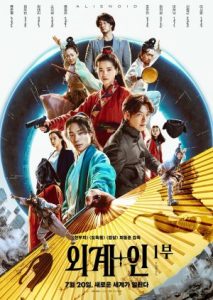
*This is how the theatrical English subtitles refer to her, though note that she is played by an actress in her 30s, and other sources render it as “the woman who shoots thunder.” See also Feeling Asian and Hairy Butthole host Youngmi Mayer’s thread on how translators are underpaid and overworked, and how this fundamentally alters intended messages.
**Arley: I mean, I enjoy Doctor Who, I’ve watched nearly every season and movie (PLUS some of the spin-off shows!), probably because I grew up watching it. But honestly? It’s often goofy and random and seriously full of plot holes….
Written & directed by: Choi Dong-hoon
Starring: Ryu Jun-yeol, Kim Woo-bin, Kim Tae-ri, So Ji-sub, Yum Jung-ah, Jo Woo-jin, Kim Eui-sung, Lee Hanee, Shin Jung-geun & Kim Dae-myung

ARLEY SORG, Senior Editor, has been part of the Locus crew since 2014. Arley is a 2022 Kate Wilhelm Solstice Award recipient. He is also a 2021 and 2022 World Fantasy Award finalist as well as a 2022 Locus Award finalist for his work as co-Editor-in-Chief at Fantasy Magazine. He is a 2022 Ignyte Award finalist in two categories: for his work as a critic, and for his essay “What You Might Have Missed” in Uncanny Magazine. Arley is Associate Editor and reviewer at Lightspeed & Nightmare magazines, columnist for The Magazine of Fantasy and Science Fiction, and interviewer at Clarkesworld Magazine. He grew up in England, Hawaii, and Colorado, and lives in the SF Bay Area. A 2014 Odyssey Writing Workshop graduate, he can be found at arleysorg.com – where he has started his own “casual interview” series with authors and editors – and on Twitter (@arleysorg).
JOSH PEARCE has stories and poetry in Analog, Asimov’s, Beneath Ceaseless Skies, Cast of Wonders, Clarkesworld, IGMS, Nature, and more. Find him on Twitter: @fictionaljosh, or at fictionaljosh.com. One time, Ken Jennings signed his chest.
 While you are here, please take a moment to support Locus with a one-time or recurring donation. We rely on reader donations to keep the magazine and site going, and would like to keep the site paywall free, but WE NEED YOUR FINANCIAL SUPPORT to continue quality coverage of the science fiction and fantasy field.
While you are here, please take a moment to support Locus with a one-time or recurring donation. We rely on reader donations to keep the magazine and site going, and would like to keep the site paywall free, but WE NEED YOUR FINANCIAL SUPPORT to continue quality coverage of the science fiction and fantasy field.
©Locus Magazine. Copyrighted material may not be republished without permission of LSFF.


